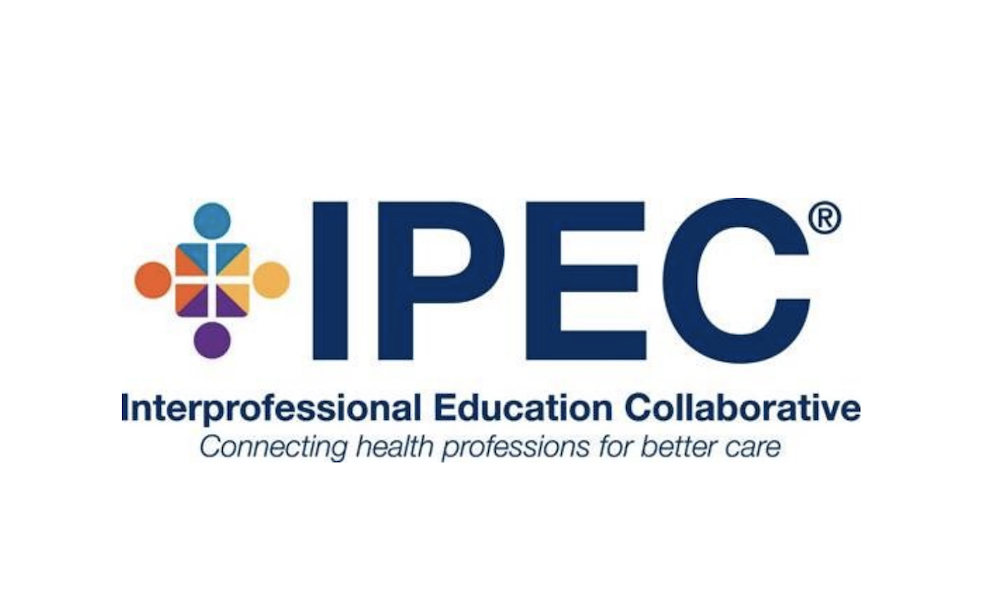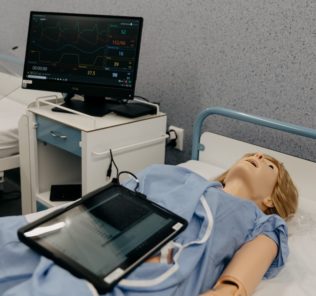IPEC Core Competencies for Interprofessional Collaborative Practice
As interprofessional healthcare simulation education has grown in popularity, a need to define levels of competence has developeded. The Interprofessional Education Collaborative (IPEC) has helped connect health professionals for better care through the establishment and publication of several core competencies. First adopted in 2011, these competencies were then updated in 2016 to reflect changes that have occurred across the healthcare system since the release of the original report. These core competencies have been widely disseminated throughout the healthcare professions and embedded into both curriculum and accreditation standards. This article shares information regarding the core competencies, explaining how each is relevant to the healthcare simulation industry.
Initially, the IPEC panel identified four core competency domains: 1) values and ethics; 2) roles and responsibilities for collaborative practice; 3) interprofessional communication; and 4) teamwork and team-based care. Both the 2010 and 2016 publications are inspired by a vision of interprofessional collaborative practice as key to the safe, high quality, accessible, patient-centered care desired by all.
Notably, two of the most significant 2016 updates emphasized the need for increased focus on the Triple Aim (improving the experience of care, improving the health of populations, and reducing the per capita cost of healthcare) and the implementation of the Patient Protection and Affordable Care Act in 2010. These focuses help build upon the original intent to increase each profession’s expected disciplinary competencies in defining competencies for interprofessional collaborative practice.
Sponsored Content:
More About the IPEC Core Competencies 2016 Update
Overall, the 2016 IPEC Core Competencies update is broken down into six sections: an executive summary, introduction, integration of the IPEC Core Competencies, competency-based interprofessional education (definitional framework), resources, and an appendix. Within the “Integration of the IPEC Core Competencies” section, subcategories include dissemination and impact; support from the health professions education community; interprofessional education reflected in accreditation; IPEC faculty development institutes; and IPEC PORTAL collection.
The “Competency-Based Interprofessional Education: Definitional Framework” section is then broken down into these sub-sections: interprofessional collaboration domain; four core competencies; and IPEC Core Competencies for collaborative practice.
This update retains most of the original wording of the general competency statements and related sub-competencies, revised to integrate population health concepts, recognizing that these statements have been used in mapping curricula or as an organizing framework for efforts such as the IPE PORTAL resource collection, IPEC Faculty Development Institutes, and the American Association of Colleges of Pharmacy’s (AACP’s) Professions Quest. Of the four core competencies, the 2016 updates to the competencies and sub-competencies appear in bold:
Sponsored Content:
Competency 1
Work with individuals of other professions to maintain a climate of mutual respect and shared values. (Values/Ethics for Interprofessional Practice)
Competency 2
Use the knowledge of one’s own role and those of other professions to appropriately assess and address the healthcare needs of patients and to promote and advance the health of populations. (Roles/Responsibilities)
Competency 3
Communicate with patients, families, communities, and professionals in health and other fields in a responsive and responsible manner that supports a team approach to the promotion and maintenance of health and the prevention and treatment of disease. (Interprofessional Communication)
Competency 4
Apply relationship-building values and the principles of team dynamics to perform effectively in different team roles to plan, deliver, and evaluate patient/population-centered care and population health programs and policies that are safe, timely, efficient, effective, and equitable. (Teams and Teamwork)
According to IPEC, the purpose of the 2016 IPEC Core Competencies update was to reaffirm the value and impact of the core competencies and sub-competencies as promulgated under the auspices of IPEC. Another goal was to organize the competencies within a singular domain of Interprofessional Collaboration, encompassing the topics of values and ethics, roles and responsibilities, interprofessional communication, and teams and teamwork. These four topical areas were initially proposed as domains within interprofessional education (IPE).
However, IPEC explains that, in the time since publication, interprofessional collaboration standing as a domain unto itself has become clear. This has meant that creating shared taxonomy among the health professions serves to streamline and synergize educational activities and related assessment and evaluation efforts. Further, the organization believes the update was able to successfully broaden the interprofessional competencies to better achieve the Triple Aim (improve the patient experience of care, improve the health of populations, and reduce the per capita cost of healthcare), with particular reference to population health.
The report states: “Perhaps the most important outcome of this updated orientation in IPEC’s expanded competency model towards population health is providing an enabling framework for clinical care providers, public health practitioners, and professionals from other fields to collaborate more effectively and creatively across disciplines to optimize healthcare and advance population health.”
“To actually deliver on the promise of interprofessional education and practice to improve the health of individuals and populations as well as reduce health disparities, we have to ensure that this framework is central in the education of all health professionals,” Harrison C. Spencer, MD, MPH, DTM&H, CPH, IPEC Board Chair and President and CEO, Association of Schools and Programs of Public Health, said in the report. “Changing and making all health professional education more consistent can help set the stage for the health system of the future we want to create together.”
More About IPEC
IPEC’s mission is to ensure that new and current health professionals are proficient in the competencies essential for the patient-centered, community- and population-oriented, interprofessional, collaborative practice. In 2009, six national education associations of schools of the health professions formed a collaborative to promote and encourage constituent efforts that would advance substantive interprofessional learning experiences.
This was done to help prepare future health professionals for enhanced team-based care of patients and improved population health outcomes. These organizations that represent higher education in allopathic and osteopathic medicine, dentistry, nursing, pharmacy, and public health created core competencies for interprofessional collaborative practice to guide curricula development across health professions schools.
Although the original 2011 panel focused recommendations on the professions of medicine, nursing, pharmacy, dentistry, and public health, IPEC continues to engage multiple health professions in its efforts to guide curriculum development across health professions schools.
IPEC now represents 21 national health professions associations. Eligible institutional members must be associations that represent and serve academic units at institutions of higher education that provide an educational program leading to the award of one or more academic degrees to students in one or more of the health professions that provide direct care to patients.
Read the Full 2016 IPEC Core Competencies Update
Lance Baily, BA, EMT-B, is the Founder / CEO of HealthySimulation.com, which he started in 2010 while serving as the Director of the Nevada System of Higher Education’s Clinical Simulation Center of Las Vegas. Lance also founded SimGHOSTS.org, the world’s only non-profit organization dedicated to supporting professionals operating healthcare simulation technologies. His co-edited Book: “Comprehensive Healthcare Simulation: Operations, Technology, and Innovative Practice” is cited as a key source for professional certification in the industry. Lance’s background also includes serving as a Simulation Technology Specialist for the LA Community College District, EMS fire fighting, Hollywood movie production, rescue diving, and global travel. He and his wife live with their two brilliant daughters and one crazy dachshund in Las Vegas, Nevada.
Sponsored Content:

















